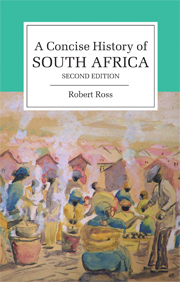Book contents
- Frontmatter
- Dedication
- Contents
- List of illustrations
- Preface
- Terminology and orthography
- Introduction
- 1 The settlement of the country
- 2 Colonial conquest
- 3 Unification
- 4 Consolidation
- 5 Apartheid
- 6 The costs of apartheid
- 7 ‘Let freedom reign’: the ending of apartheid and the transition to democracy, 1980–1994
- 8 Epilogue: the acid rain of freedom
- Suggestions for further reading
- Index
Introduction
Published online by Cambridge University Press: 18 December 2014
- Frontmatter
- Dedication
- Contents
- List of illustrations
- Preface
- Terminology and orthography
- Introduction
- 1 The settlement of the country
- 2 Colonial conquest
- 3 Unification
- 4 Consolidation
- 5 Apartheid
- 6 The costs of apartheid
- 7 ‘Let freedom reign’: the ending of apartheid and the transition to democracy, 1980–1994
- 8 Epilogue: the acid rain of freedom
- Suggestions for further reading
- Index
Summary
South Africa is a single country. At one level this may seem to be an extremely banal statement, but at another it is highly contested. For many years, the government of the country denied it. Even now, South Africans have to struggle to recognise it as correct. The African National Congress (ANC), which sees itself as the embodiment of the nation's unity, campaigned under the slogan ‘One Nation, Many Cultures’. Archbishop Desmond Tutu writes of ‘The Rainbow People of God’. The country has eleven recognised official languages. Its divisions are so great that, within South Africa, calling the country single is more of a routine statement, or a pious hope, than a statement of fact.
The view from outside South Africa, where this book is written, is different. After all, all countries are divided by the cultural background (‘race’ or ‘ethnicity’) of their citizens, by religion, by economic differentials, by gender. In South Africa, these splits may be sharper than, but are not different in kind from, those found elsewhere. Indeed, however much South Africans may emphasise the distinctions between themselves, they are immediately recognisable as South Africans, no matter from where in the country, socially and geographically, they originate.
This book is an attempt to show how South Africa became a single, though not uniform, country. That it has become so should not be a matter for dispute. Take, for instance, the country's economy. Throughout the twentieth century, and indeed beginning much earlier, there was a steady incorporation of previously more or less independent units into a single interdependent totality. There can now not be any household in South Africa which is not tied, in all sorts of ways, into the national (and thus international) economy. South Africa no longer has any exclusively subsistence peasants. Culturally, no process of homogenisation has taken place. South African society is probably as diverse as ever, and possibly more so.
- Type
- Chapter
- Information
- A Concise History of South Africa , pp. 1 - 4Publisher: Cambridge University PressPrint publication year: 2008



